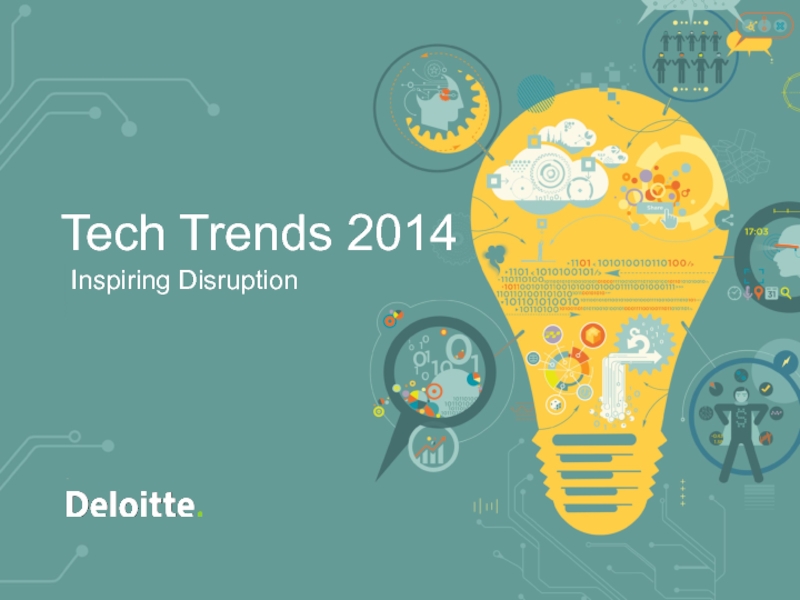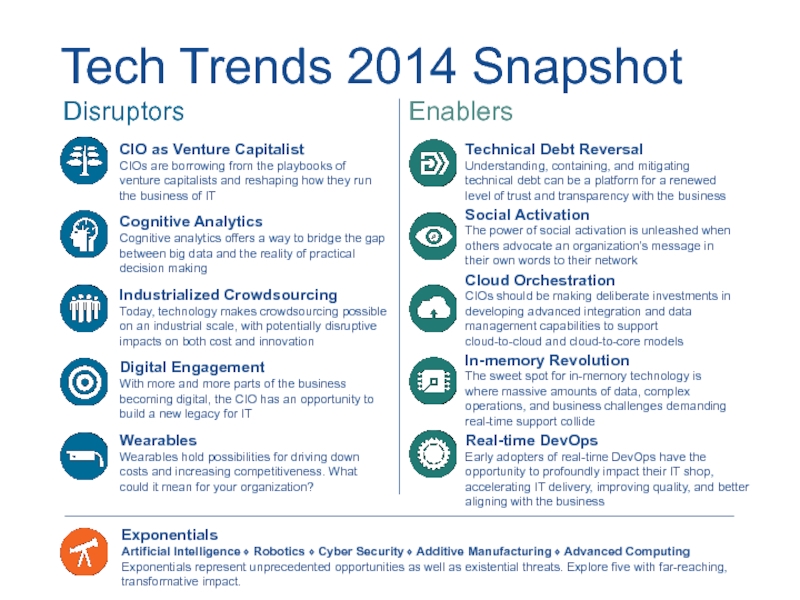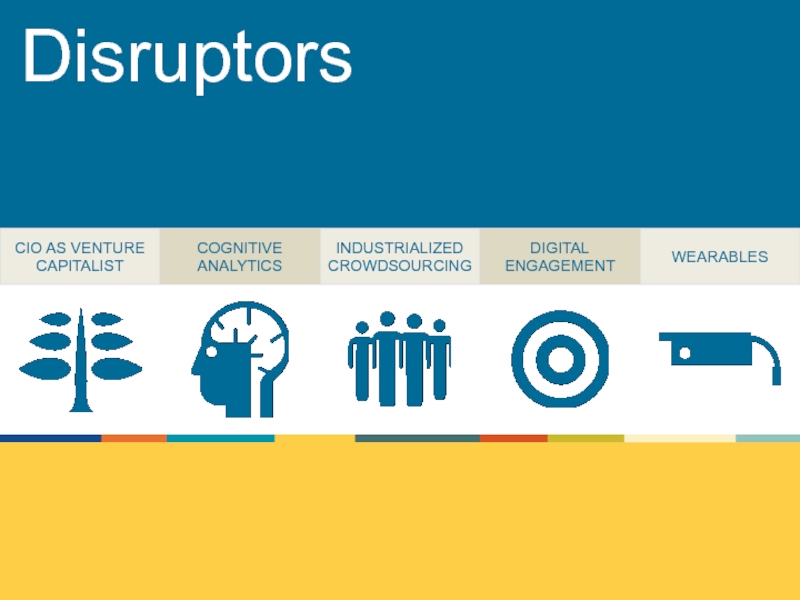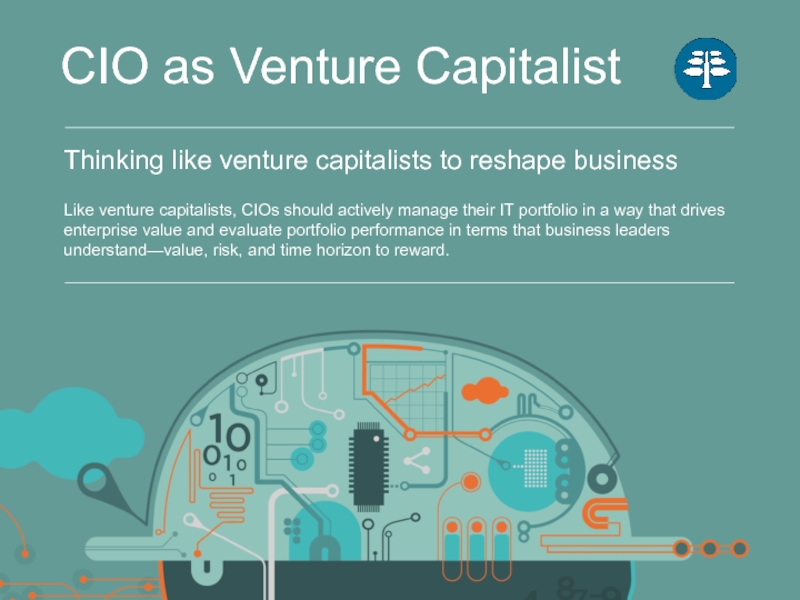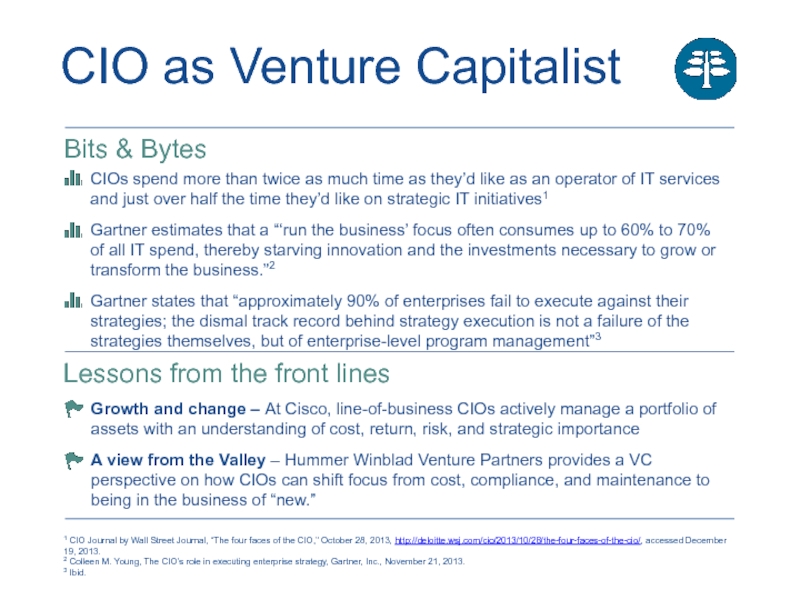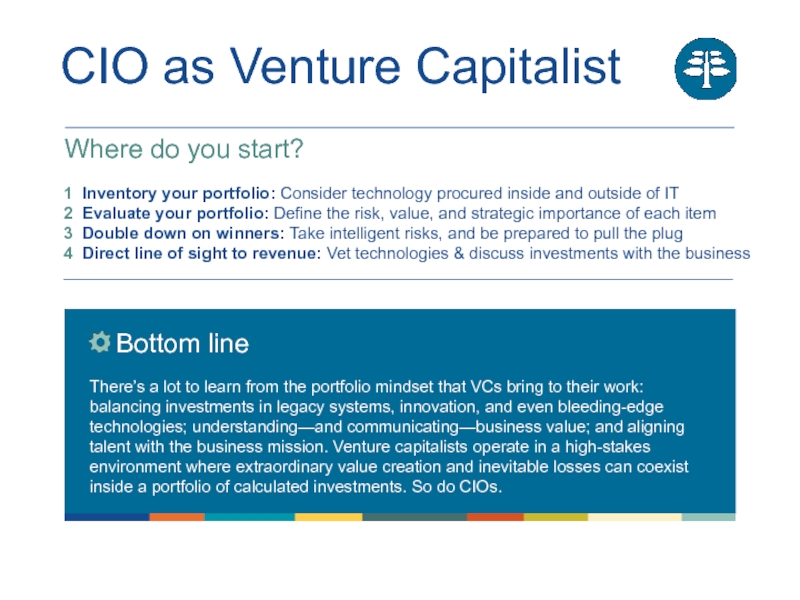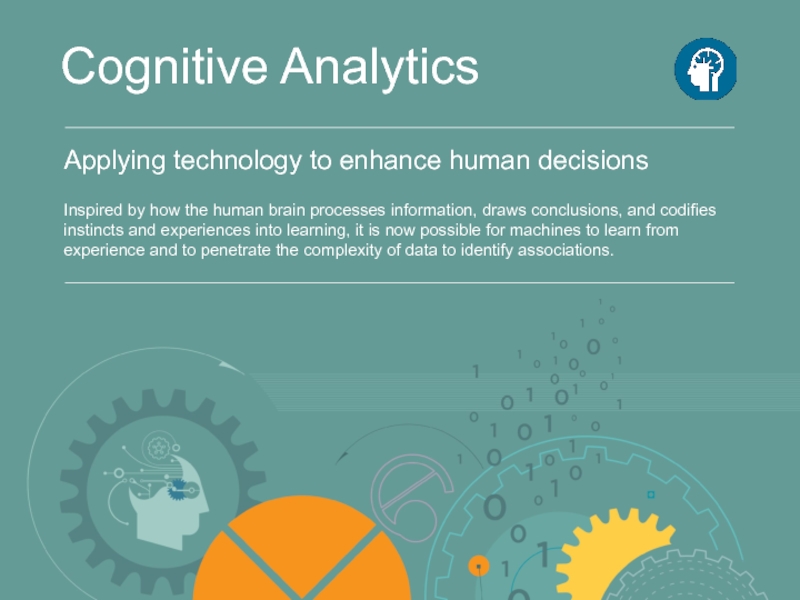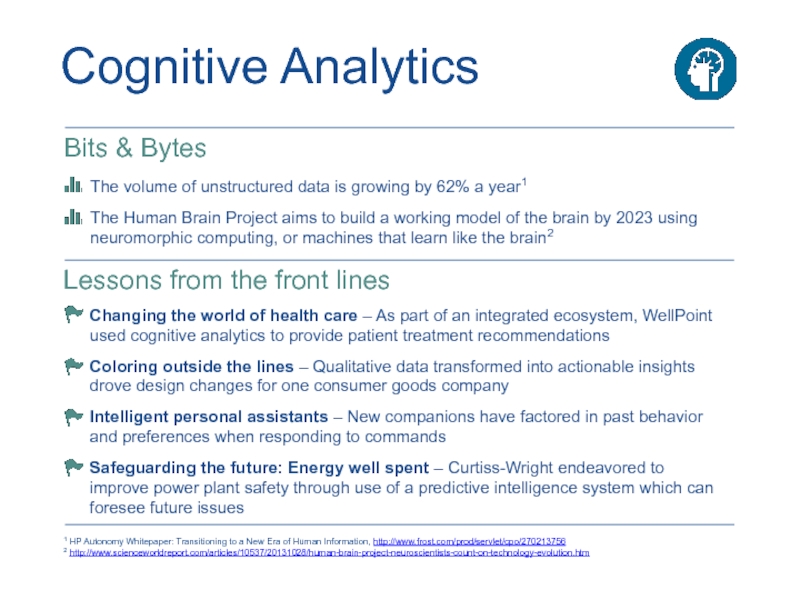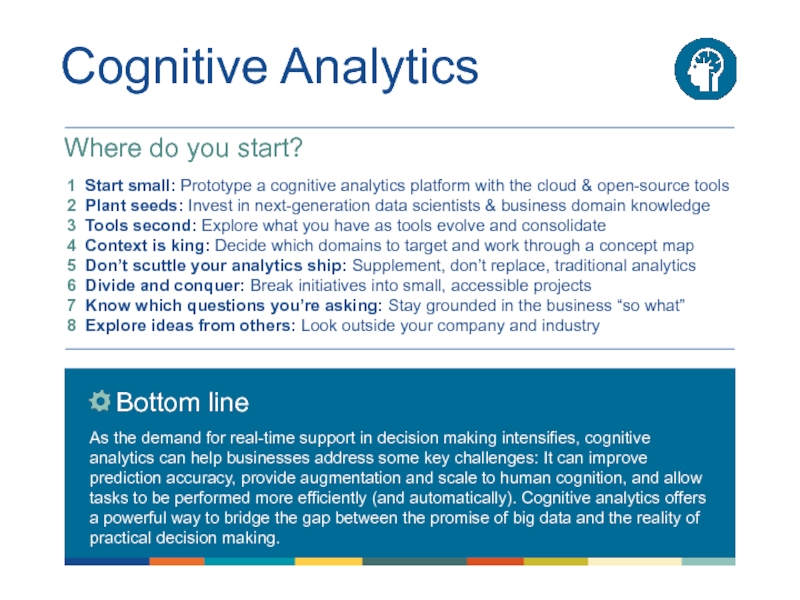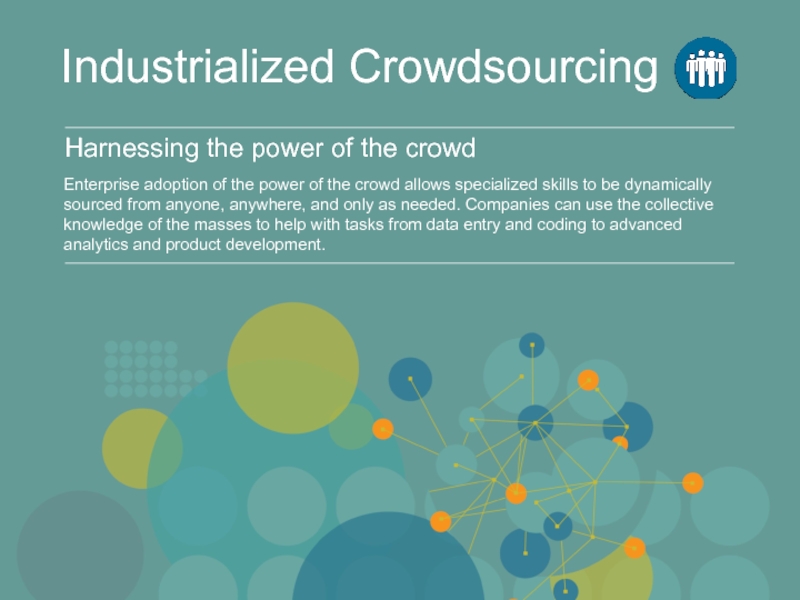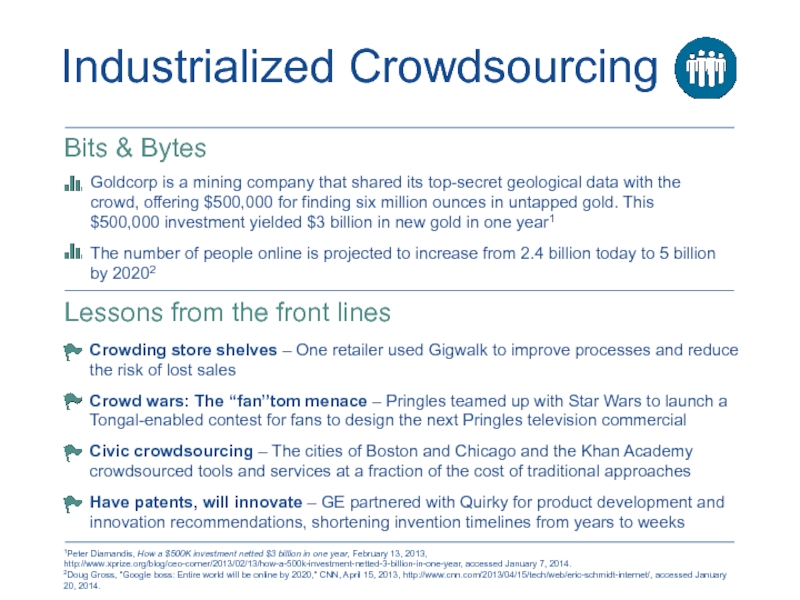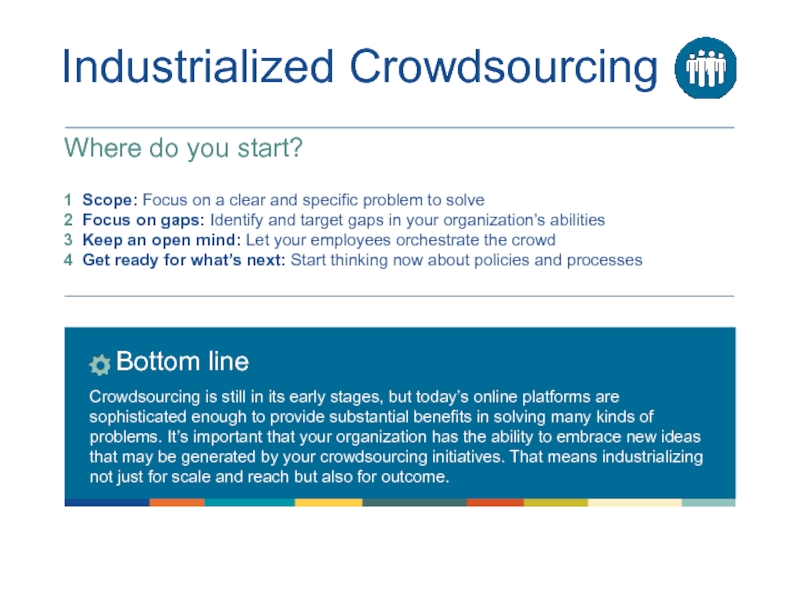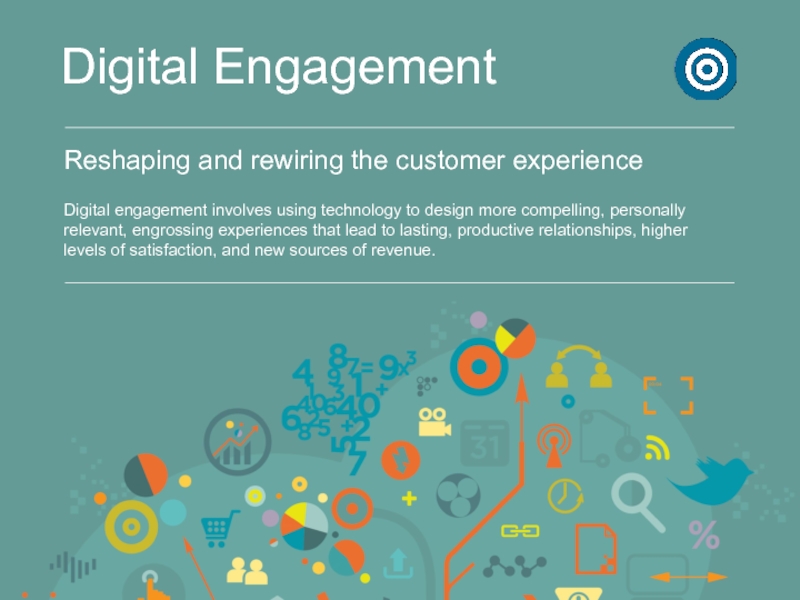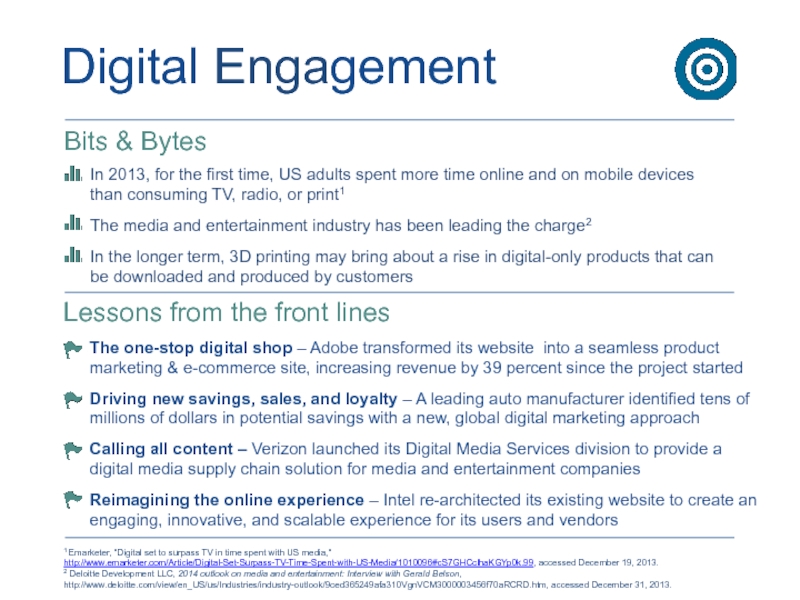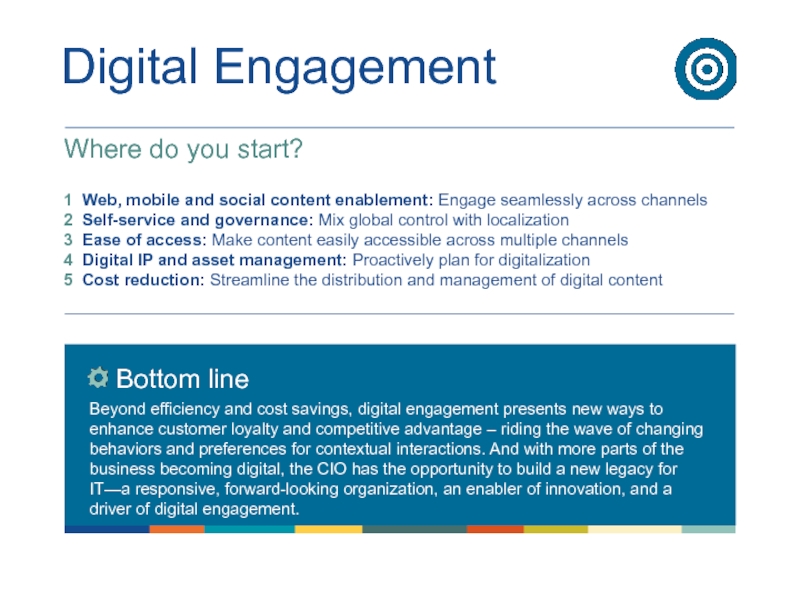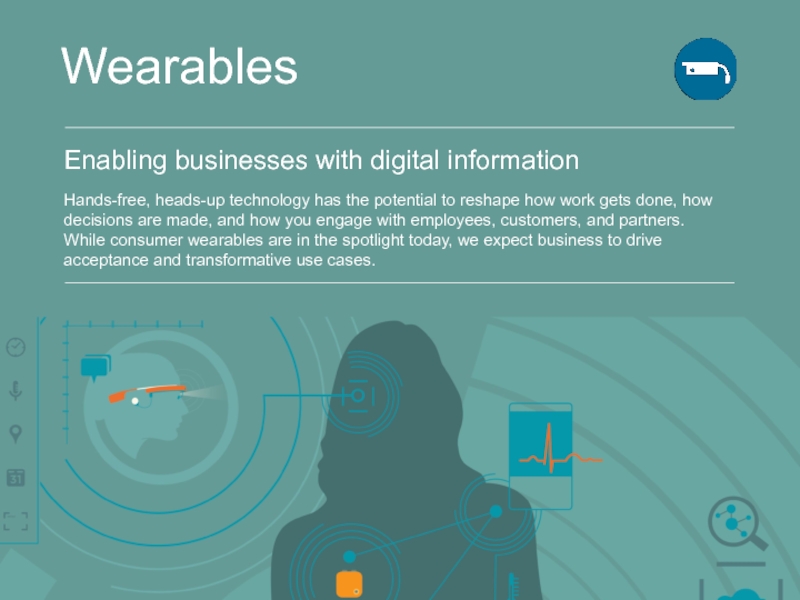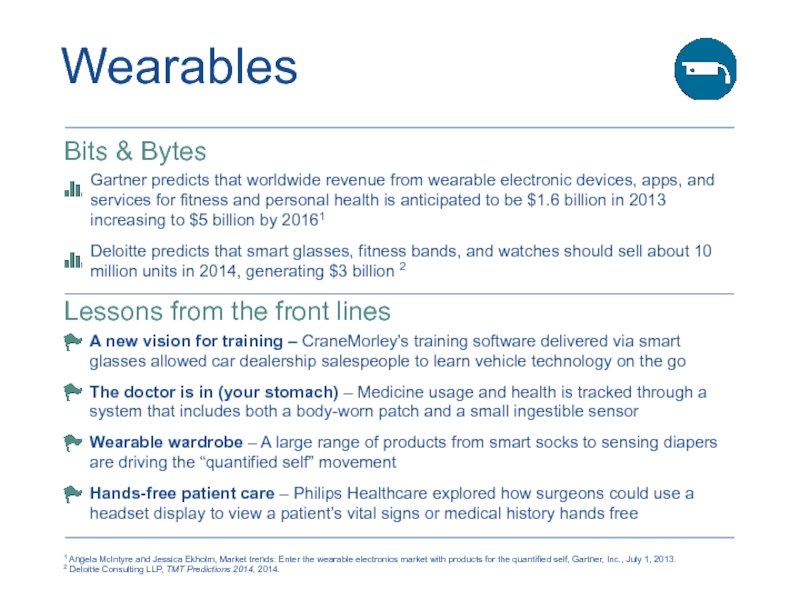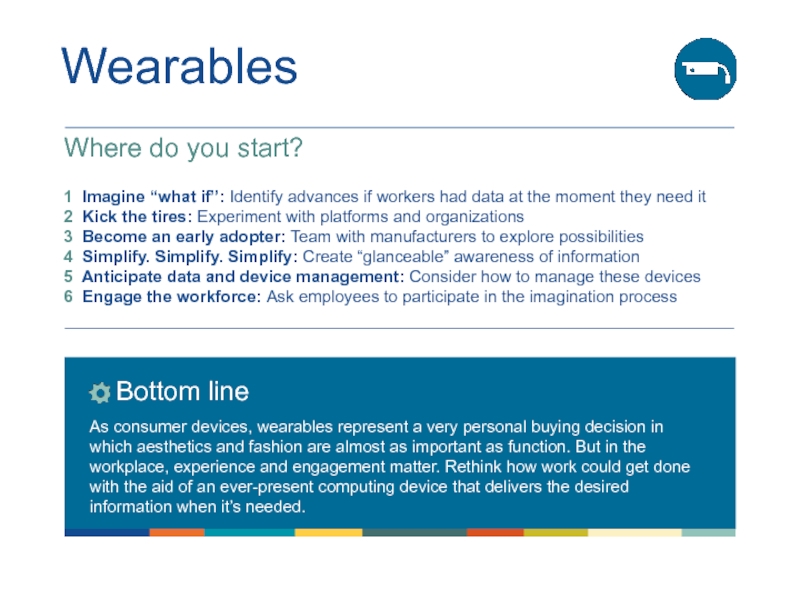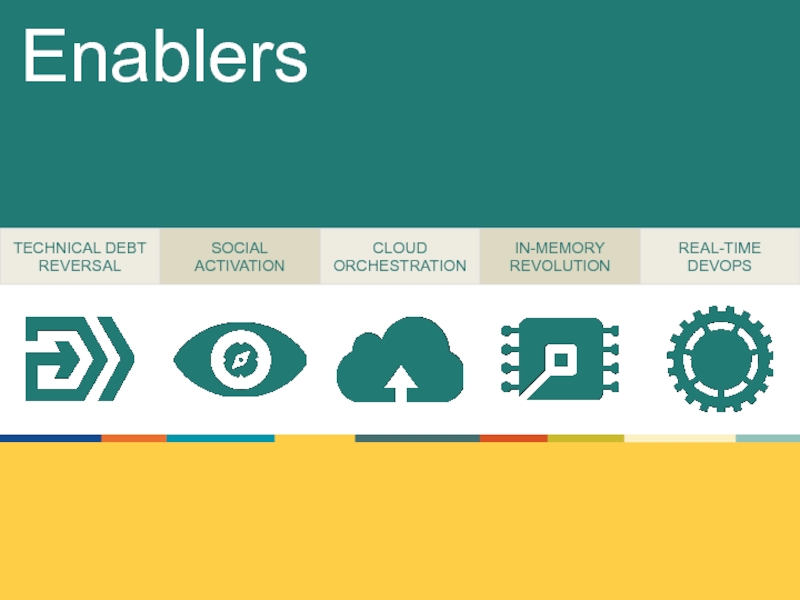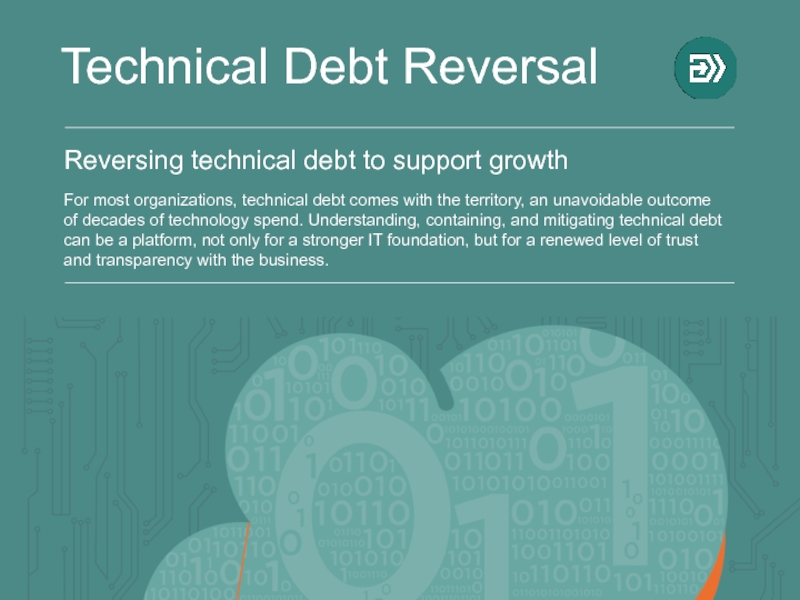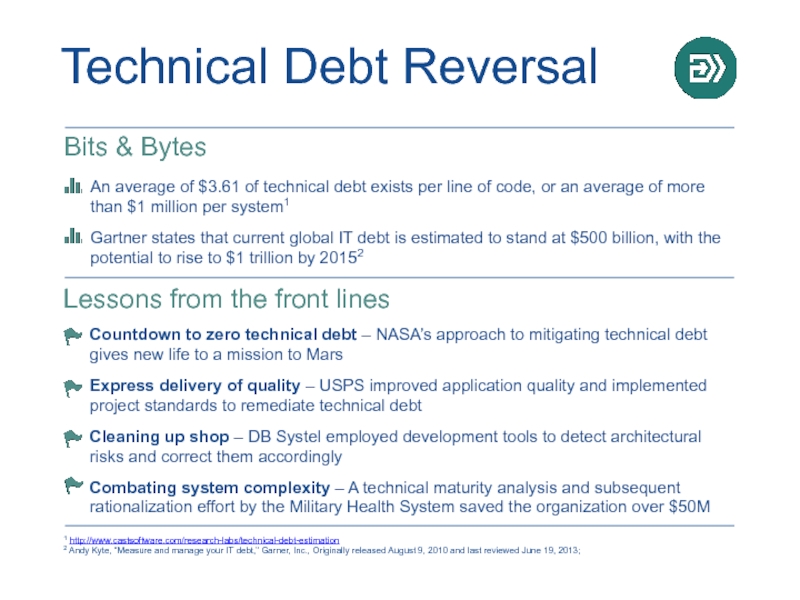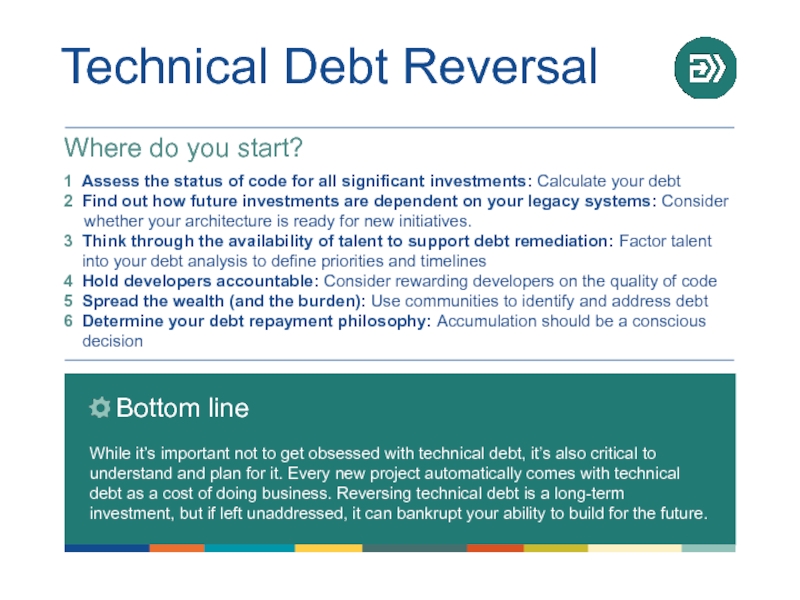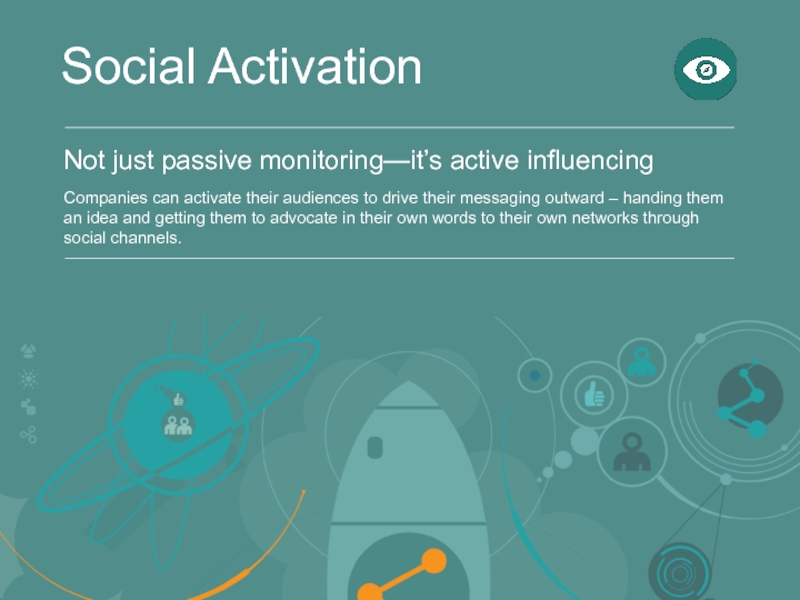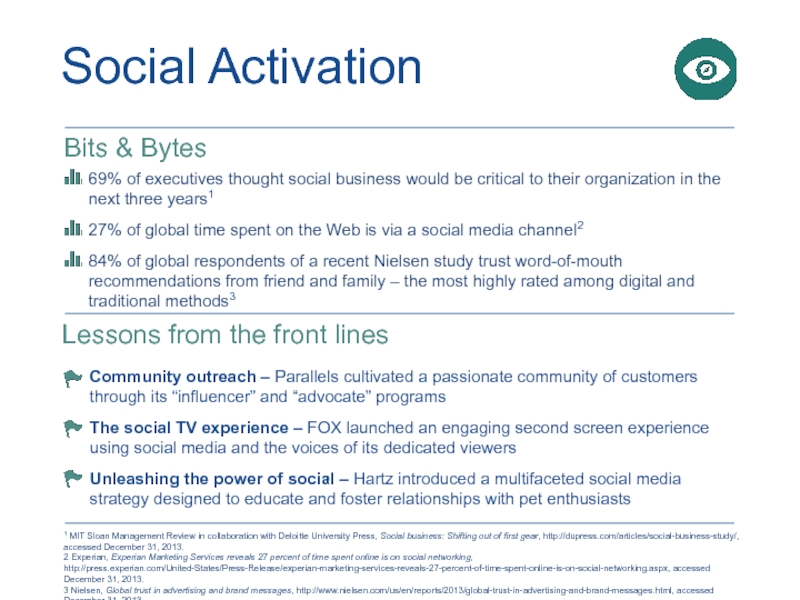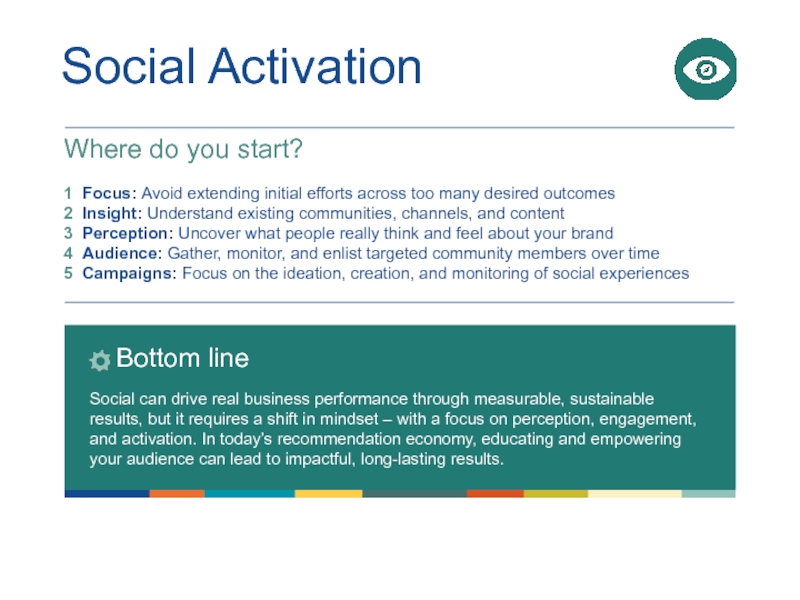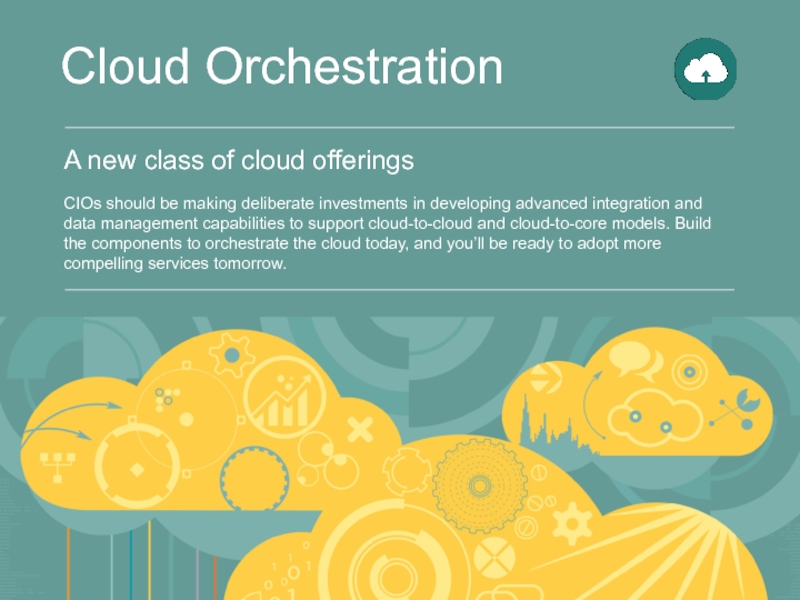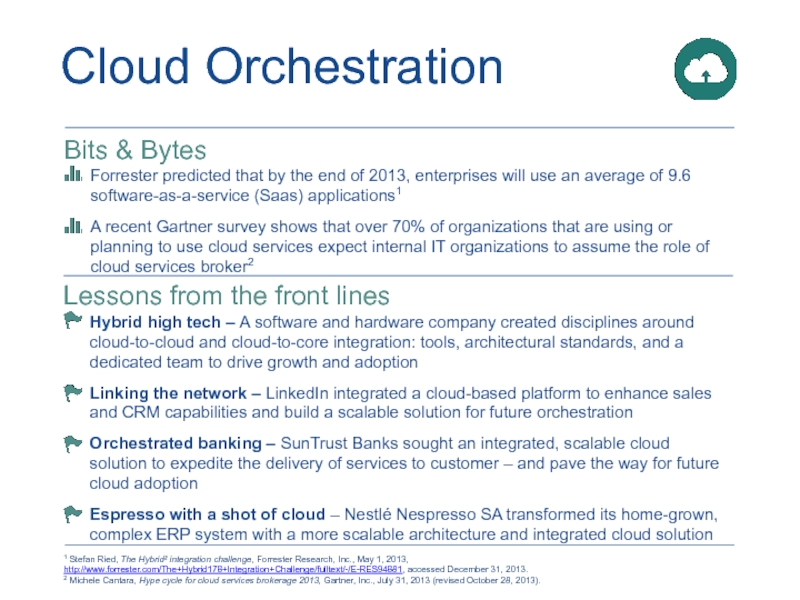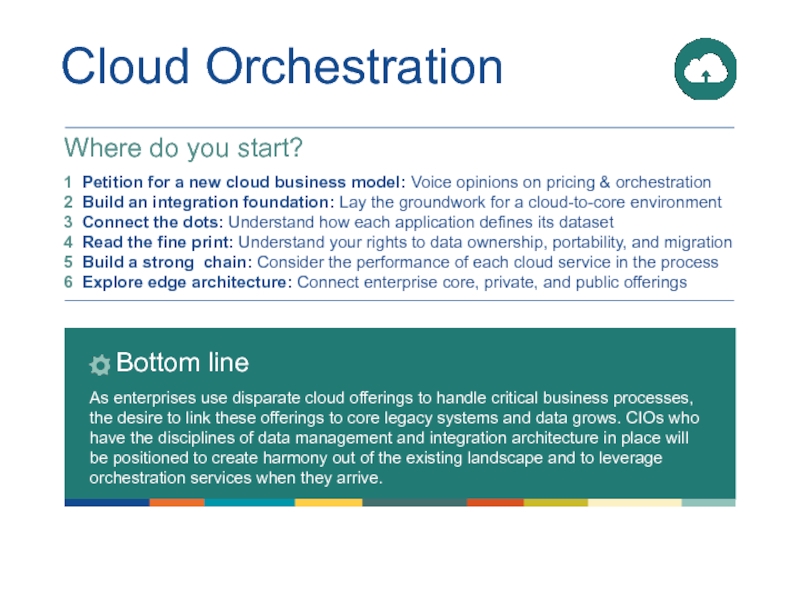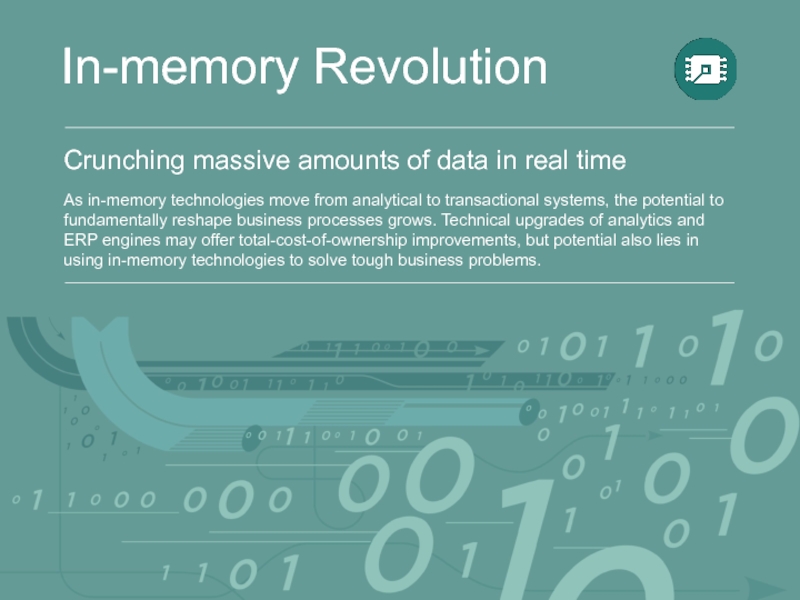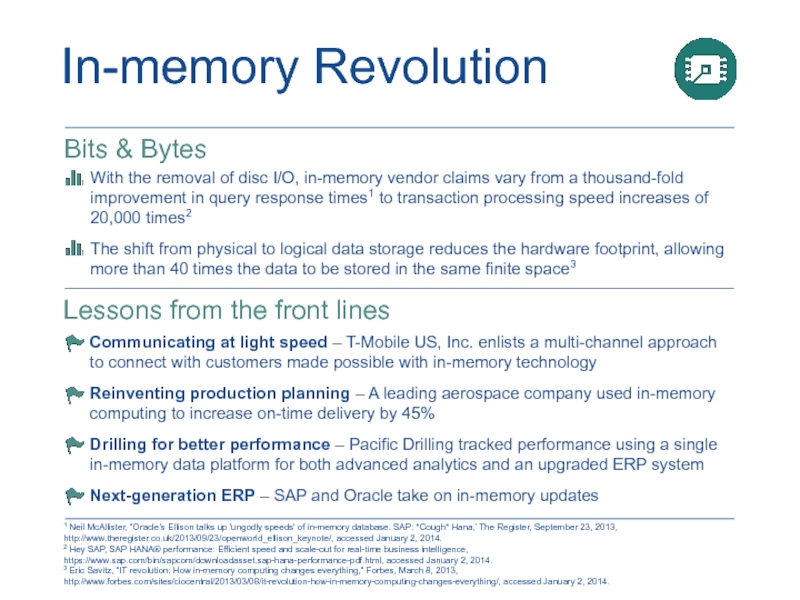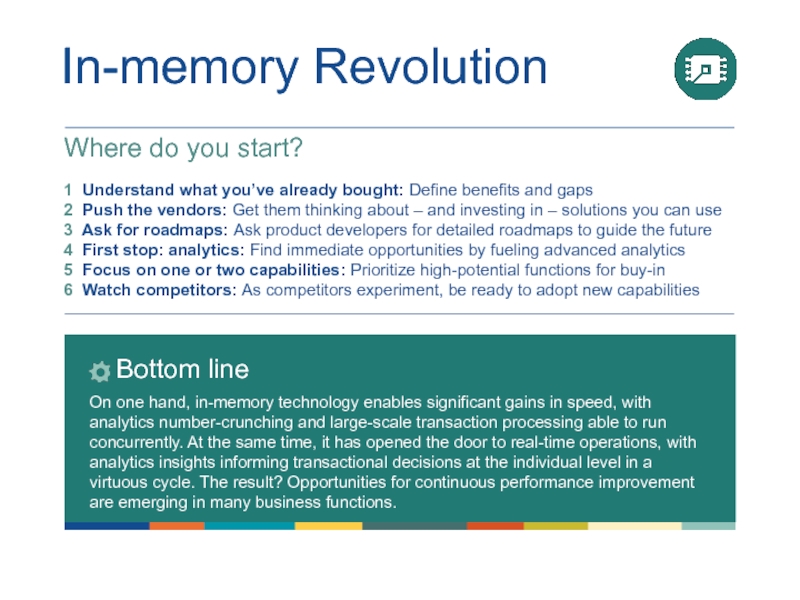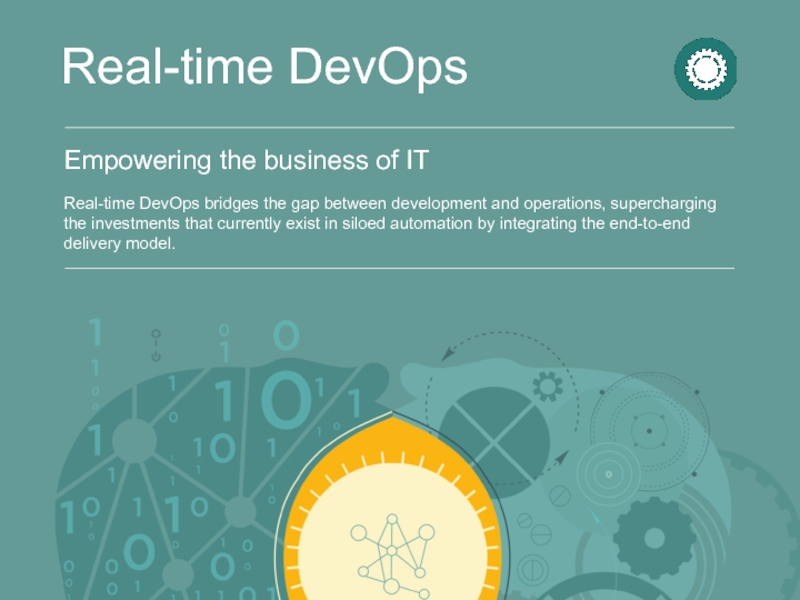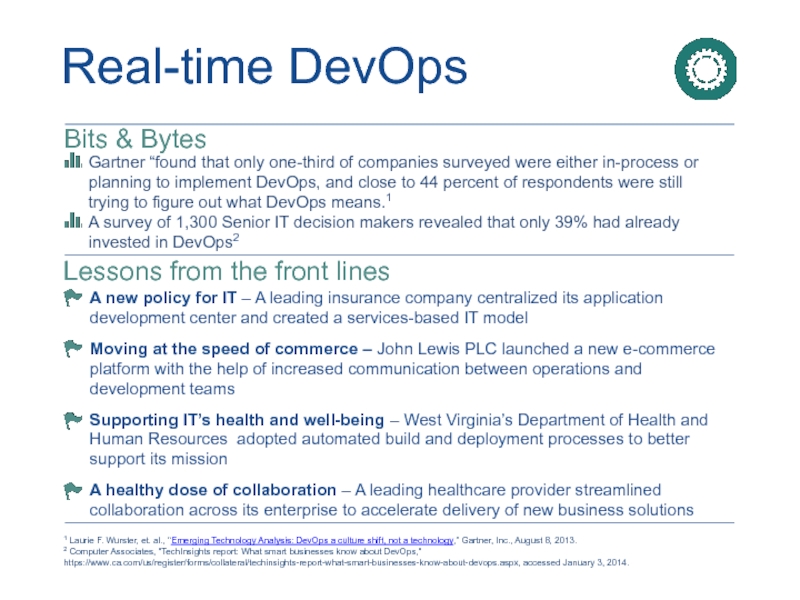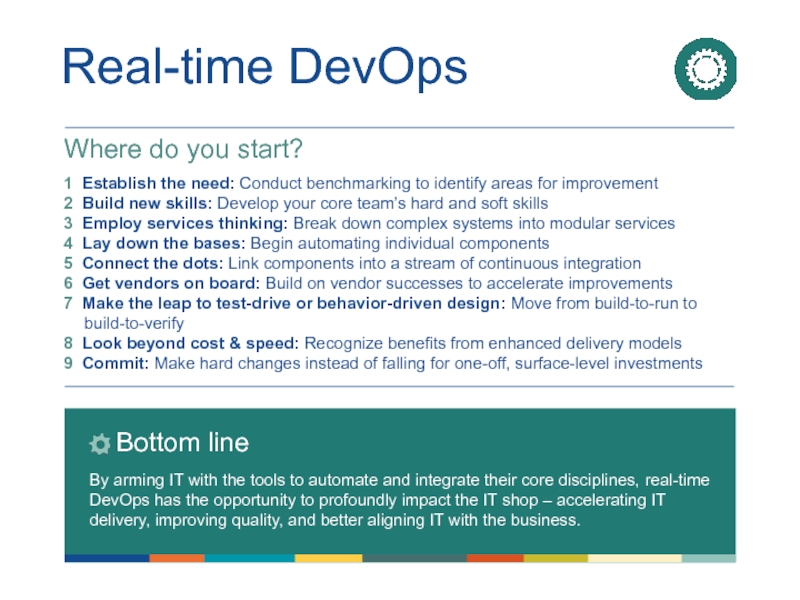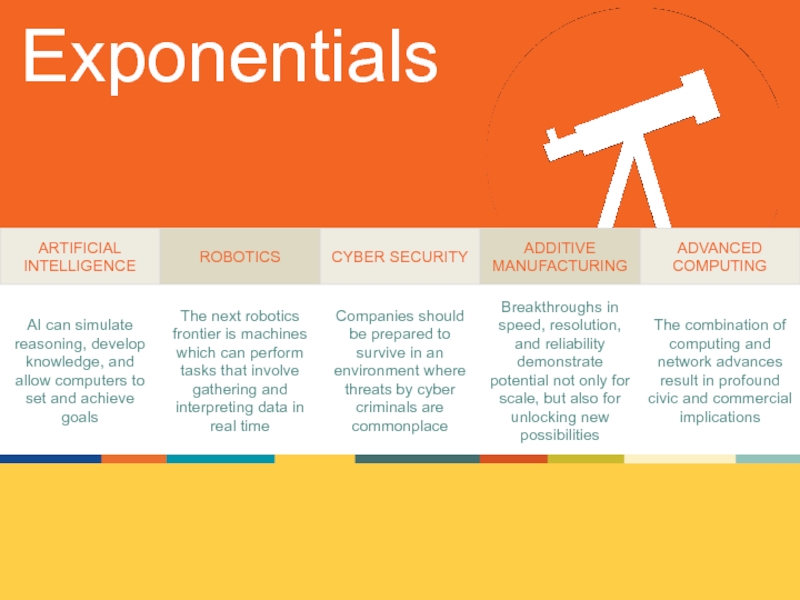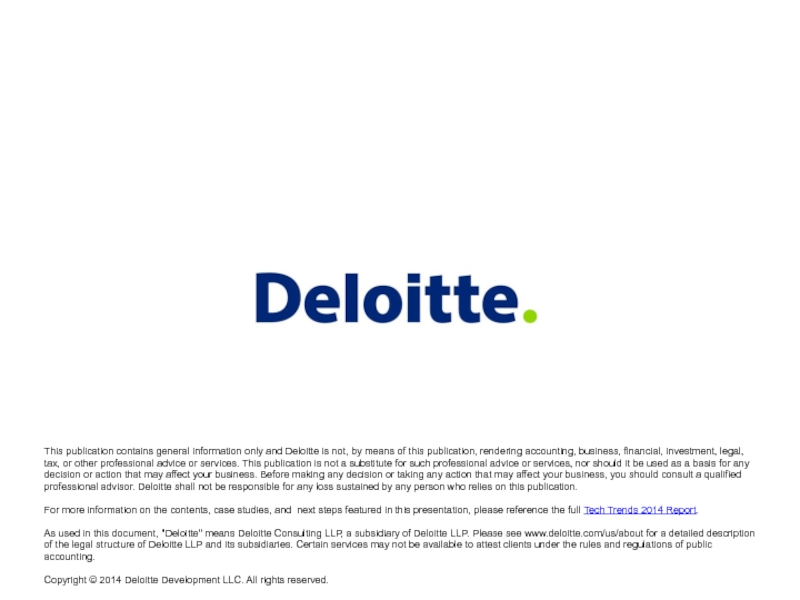- Главная
- Разное
- Дизайн
- Бизнес и предпринимательство
- Аналитика
- Образование
- Развлечения
- Красота и здоровье
- Финансы
- Государство
- Путешествия
- Спорт
- Недвижимость
- Армия
- Графика
- Культурология
- Еда и кулинария
- Лингвистика
- Английский язык
- Астрономия
- Алгебра
- Биология
- География
- Детские презентации
- Информатика
- История
- Литература
- Маркетинг
- Математика
- Медицина
- Менеджмент
- Музыка
- МХК
- Немецкий язык
- ОБЖ
- Обществознание
- Окружающий мир
- Педагогика
- Русский язык
- Технология
- Физика
- Философия
- Химия
- Шаблоны, картинки для презентаций
- Экология
- Экономика
- Юриспруденция
Tech Trends 2014 презентация
Содержание
- 1. Tech Trends 2014
- 2. Tech Trends 2014 Snapshot Disruptors Enablers
- 3. Disruptors CIO AS VENTURE CAPITALIST COGNITIVE ANALYTICS INDUSTRIALIZED CROWDSOURCING DIGITAL ENGAGEMENT WEARABLES
- 4. CIO as Venture Capitalist Thinking like venture
- 5. CIO as Venture Capitalist 1 CIO Journal
- 6. CIO as Venture Capitalist Bottom line
- 7. Applying technology to enhance human decisions Cognitive
- 8. Cognitive Analytics 1 HP Autonomy Whitepaper: Transitioning
- 9. Cognitive Analytics Bottom line As the
- 10. Harnessing the power of the crowd
- 11. 1Peter Diamandis, How a $500K investment netted
- 12. Industrialized Crowdsourcing Bottom line Crowdsourcing is
- 13. Reshaping and rewiring the customer experience
- 14. 1 Emarketer, "Digital set to surpass TV
- 15. Digital Engagement Bottom line Beyond efficiency
- 16. Wearables Enabling businesses with digital information Hands-free,
- 17. Wearables 1 Angela McIntyre and Jessica Ekholm,
- 18. Wearables Bottom line As consumer devices,
- 19. Enablers TECHNICAL DEBT REVERSAL SOCIAL
- 20. Technical Debt Reversal Reversing technical debt to
- 21. Technical Debt Reversal 1 http://www.castsoftware.com/research-labs/technical-debt-estimation 2
- 22. Technical Debt Reversal Bottom line While
- 23. Not just passive monitoring—it’s active influencing
- 24. Social Activation Bits & Bytes 69% of
- 25. 1 Focus: Avoid extending initial efforts across
- 26. A new class of cloud offerings
- 27. Cloud Orchestration Bits & Bytes Forrester predicted
- 28. Cloud Orchestration Bottom line As enterprises
- 29. Crunching massive amounts of data in real
- 30. In-memory Revolution 1 Neil McAllister, “Oracle's Ellison
- 31. In-memory Revolution Bottom line On one
- 32. Empowering the business of IT Real-time
- 33. A new policy for IT – A
- 34. Real-time DevOps Bottom line By arming
- 35. AI can simulate reasoning, develop
- 36. Questions? Email OCTO@deloitte.com
- 37. This publication contains general information only and
Слайд 2Tech Trends 2014 Snapshot
Disruptors
Enablers
CIO as Venture Capitalist
CIOs are borrowing from
Cognitive Analytics
Cognitive analytics offers a way to bridge the gap between big data and the reality of practical decision making
Industrialized Crowdsourcing
Today, technology makes crowdsourcing possible on an industrial scale, with potentially disruptive impacts on both cost and innovation
Digital Engagement
With more and more parts of the business becoming digital, the CIO has an opportunity to build a new legacy for IT
Wearables
Wearables hold possibilities for driving down costs and increasing competitiveness. What could it mean for your organization?
Technical Debt Reversal
Understanding, containing, and mitigating technical debt can be a platform for a renewed level of trust and transparency with the business
Social Activation
The power of social activation is unleashed when others advocate an organization’s message in their own words to their network
Cloud Orchestration
CIOs should be making deliberate investments in developing advanced integration and data management capabilities to support cloud-to-cloud and cloud-to-core models
In-memory Revolution
The sweet spot for in-memory technology is where massive amounts of data, complex operations, and business challenges demanding real-time support collide
Real-time DevOps
Early adopters of real-time DevOps have the opportunity to profoundly impact their IT shop, accelerating IT delivery, improving quality, and better aligning with the business
Exponentials
Artificial Intelligence ⬧ Robotics ⬧ Cyber Security ⬧ Additive Manufacturing ⬧ Advanced Computing
Exponentials represent unprecedented opportunities as well as existential threats. Explore five with far-reaching, transformative impact.
Слайд 3
Disruptors
CIO AS VENTURE CAPITALIST
COGNITIVE ANALYTICS
INDUSTRIALIZED CROWDSOURCING
DIGITAL ENGAGEMENT
WEARABLES
Слайд 4CIO as Venture Capitalist
Thinking like venture capitalists to reshape business
Like venture
Слайд 5CIO as Venture Capitalist
1 CIO Journal by Wall Street Journal, “The
2 Colleen M. Young, The CIO’s role in executing enterprise strategy, Gartner, Inc., November 21, 2013.
3 Ibid.
Bits & Bytes
CIOs spend more than twice as much time as they’d like as an operator of IT services and just over half the time they’d like on strategic IT initiatives1
Gartner estimates that a “‘run the business’ focus often consumes up to 60% to 70% of all IT spend, thereby starving innovation and the investments necessary to grow or transform the business.”2
Gartner states that “approximately 90% of enterprises fail to execute against their strategies; the dismal track record behind strategy execution is not a failure of the strategies themselves, but of enterprise-level program management”3
Lessons from the front lines
Growth and change – At Cisco, line-of-business CIOs actively manage a portfolio of assets with an understanding of cost, return, risk, and strategic importance
A view from the Valley – Hummer Winblad Venture Partners provides a VC perspective on how CIOs can shift focus from cost, compliance, and maintenance to being in the business of “new.”
Слайд 6
CIO as Venture Capitalist
Bottom line
There’s a lot to learn from the
Where do you start?
1 Inventory your portfolio: Consider technology procured inside and outside of IT
2 Evaluate your portfolio: Define the risk, value, and strategic importance of each item
3 Double down on winners: Take intelligent risks, and be prepared to pull the plug
4 Direct line of sight to revenue: Vet technologies & discuss investments with the business
Слайд 7Applying technology to enhance human decisions
Cognitive Analytics
Inspired by how the human
Слайд 8Cognitive Analytics
1 HP Autonomy Whitepaper: Transitioning to a New Era of
2 http://www.scienceworldreport.com/articles/10537/20131028/human-brain-project-neuroscientists-count-on-technology-evolution.htm
Bits & Bytes
The volume of unstructured data is growing by 62% a year1
The Human Brain Project aims to build a working model of the brain by 2023 using neuromorphic computing, or machines that learn like the brain2
Lessons from the front lines
Changing the world of health care – As part of an integrated ecosystem, WellPoint used cognitive analytics to provide patient treatment recommendations
Coloring outside the lines – Qualitative data transformed into actionable insights drove design changes for one consumer goods company
Intelligent personal assistants – New companions have factored in past behavior and preferences when responding to commands
Safeguarding the future: Energy well spent – Curtiss-Wright endeavored to improve power plant safety through use of a predictive intelligence system which can foresee future issues
Слайд 9
Cognitive Analytics
Bottom line
As the demand for real-time support in decision making
Where do you start?
1 Start small: Prototype a cognitive analytics platform with the cloud & open-source tools
2 Plant seeds: Invest in next-generation data scientists & business domain knowledge
3 Tools second: Explore what you have as tools evolve and consolidate
4 Context is king: Decide which domains to target and work through a concept map
5 Don’t scuttle your analytics ship: Supplement, don’t replace, traditional analytics
6 Divide and conquer: Break initiatives into small, accessible projects
7 Know which questions you’re asking: Stay grounded in the business “so what”
8 Explore ideas from others: Look outside your company and industry
Слайд 10
Harnessing the power of the crowd
Industrialized Crowdsourcing
Enterprise adoption of the power
Слайд 111Peter Diamandis, How a $500K investment netted $3 billion in one
2Doug Gross, "Google boss: Entire world will be online by 2020," CNN, April 15, 2013, http://www.cnn.com/2013/04/15/tech/web/eric-schmidt-internet/, accessed January 20, 2014.
Industrialized Crowdsourcing
Bits & Bytes
Goldcorp is a mining company that shared its top-secret geological data with the crowd, offering $500,000 for finding six million ounces in untapped gold. This $500,000 investment yielded $3 billion in new gold in one year1
The number of people online is projected to increase from 2.4 billion today to 5 billion by 20202
Lessons from the front lines
Crowding store shelves – One retailer used Gigwalk to improve processes and reduce the risk of lost sales
Crowd wars: The “fan”tom menace – Pringles teamed up with Star Wars to launch a Tongal-enabled contest for fans to design the next Pringles television commercial
Civic crowdsourcing – The cities of Boston and Chicago and the Khan Academy crowdsourced tools and services at a fraction of the cost of traditional approaches
Have patents, will innovate – GE partnered with Quirky for product development and innovation recommendations, shortening invention timelines from years to weeks
Слайд 12
Industrialized Crowdsourcing
Bottom line
Crowdsourcing is still in its early stages, but today’s
Where do you start?
1 Scope: Focus on a clear and specific problem to solve
2 Focus on gaps: Identify and target gaps in your organization’s abilities
3 Keep an open mind: Let your employees orchestrate the crowd
4 Get ready for what’s next: Start thinking now about policies and processes
Слайд 13
Reshaping and rewiring the customer experience
Digital Engagement
Digital engagement involves using technology
Слайд 141 Emarketer, "Digital set to surpass TV in time spent with
2 Deloitte Development LLC, 2014 outlook on media and entertainment: Interview with Gerald Belson, http://www.deloitte.com/view/en_US/us/Industries/industry-outlook/9ced365249afa310VgnVCM3000003456f70aRCRD.htm, accessed December 31, 2013.
The one-stop digital shop – Adobe transformed its website into a seamless product marketing & e-commerce site, increasing revenue by 39 percent since the project started
Driving new savings, sales, and loyalty – A leading auto manufacturer identified tens of millions of dollars in potential savings with a new, global digital marketing approach
Calling all content – Verizon launched its Digital Media Services division to provide a digital media supply chain solution for media and entertainment companies
Reimagining the online experience – Intel re-architected its existing website to create an engaging, innovative, and scalable experience for its users and vendors
Digital Engagement
Bits & Bytes
In 2013, for the first time, US adults spent more time online and on mobile devices than consuming TV, radio, or print1
The media and entertainment industry has been leading the charge2
In the longer term, 3D printing may bring about a rise in digital-only products that can be downloaded and produced by customers
Lessons from the front lines
Слайд 15
Digital Engagement
Bottom line
Beyond efficiency and cost savings, digital engagement presents new
Where do you start?
1 Web, mobile and social content enablement: Engage seamlessly across channels
2 Self-service and governance: Mix global control with localization
3 Ease of access: Make content easily accessible across multiple channels
4 Digital IP and asset management: Proactively plan for digitalization
5 Cost reduction: Streamline the distribution and management of digital content
Слайд 16Wearables
Enabling businesses with digital information
Hands-free, heads-up technology has the potential to
Слайд 17Wearables
1 Angela McIntyre and Jessica Ekholm, Market trends: Enter the wearable
2 Deloitte Consulting LLP, TMT Predictions 2014, 2014.
Bits & Bytes
Gartner predicts that worldwide revenue from wearable electronic devices, apps, and services for fitness and personal health is anticipated to be $1.6 billion in 2013 increasing to $5 billion by 20161
Deloitte predicts that smart glasses, fitness bands, and watches should sell about 10 million units in 2014, generating $3 billion 2
Lessons from the front lines
A new vision for training – CraneMorley’s training software delivered via smart glasses allowed car dealership salespeople to learn vehicle technology on the go
The doctor is in (your stomach) – Medicine usage and health is tracked through a system that includes both a body-worn patch and a small ingestible sensor
Wearable wardrobe – A large range of products from smart socks to sensing diapers are driving the “quantified self” movement
Hands-free patient care – Philips Healthcare explored how surgeons could use a headset display to view a patient’s vital signs or medical history hands free
Слайд 18
Wearables
Bottom line
As consumer devices, wearables represent a very personal buying decision
Where do you start?
1 Imagine “what if”: Identify advances if workers had data at the moment they need it
2 Kick the tires: Experiment with platforms and organizations
3 Become an early adopter: Team with manufacturers to explore possibilities
4 Simplify. Simplify. Simplify: Create “glanceable” awareness of information
5 Anticipate data and device management: Consider how to manage these devices
6 Engage the workforce: Ask employees to participate in the imagination process
Слайд 19
Enablers
TECHNICAL DEBT REVERSAL
SOCIAL
ACTIVATION
CLOUD ORCHESTRATION
IN-MEMORY REVOLUTION
REAL-TIME
DEVOPS
Слайд 20Technical Debt Reversal
Reversing technical debt to support growth
For most organizations, technical
Слайд 21Technical Debt Reversal
1 http://www.castsoftware.com/research-labs/technical-debt-estimation
2 Andy Kyte, “Measure and manage your
Bits & Bytes
An average of $3.61 of technical debt exists per line of code, or an average of more than $1 million per system1
Gartner states that current global IT debt is estimated to stand at $500 billion, with the potential to rise to $1 trillion by 20152
Lessons from the front lines
Countdown to zero technical debt – NASA’s approach to mitigating technical debt gives new life to a mission to Mars
Express delivery of quality – USPS improved application quality and implemented project standards to remediate technical debt
Cleaning up shop – DB Systel employed development tools to detect architectural risks and correct them accordingly
Combating system complexity – A technical maturity analysis and subsequent rationalization effort by the Military Health System saved the organization over $50M
Слайд 22
Technical Debt Reversal
Bottom line
While it’s important not to get obsessed with
Where do you start?
1 Assess the status of code for all significant investments: Calculate your debt
2 Find out how future investments are dependent on your legacy systems: Consider whether your architecture is ready for new initiatives.
3 Think through the availability of talent to support debt remediation: Factor talent
into your debt analysis to define priorities and timelines
4 Hold developers accountable: Consider rewarding developers on the quality of code
5 Spread the wealth (and the burden): Use communities to identify and address debt
6 Determine your debt repayment philosophy: Accumulation should be a conscious
decision
Слайд 23
Not just passive monitoring—it’s active influencing
Social Activation
Companies can activate their audiences
Слайд 24Social Activation
Bits & Bytes
69% of executives thought social business would be
27% of global time spent on the Web is via a social media channel2
84% of global respondents of a recent Nielsen study trust word-of-mouth recommendations from friend and family – the most highly rated among digital and traditional methods3
Lessons from the front lines
Community outreach – Parallels cultivated a passionate community of customers through its “influencer” and “advocate” programs
The social TV experience – FOX launched an engaging second screen experience using social media and the voices of its dedicated viewers
Unleashing the power of social – Hartz introduced a multifaceted social media strategy designed to educate and foster relationships with pet enthusiasts
1 MIT Sloan Management Review in collaboration with Deloitte University Press, Social business: Shifting out of first gear, http://dupress.com/articles/social-business-study/, accessed December 31, 2013.
2 Experian, Experian Marketing Services reveals 27 percent of time spent online is on social networking, http://press.experian.com/United-States/Press-Release/experian-marketing-services-reveals-27-percent-of-time-spent-online-is-on-social-networking.aspx, accessed December 31, 2013.
3 Nielsen, Global trust in advertising and brand messages, http://www.nielsen.com/us/en/reports/2013/global-trust-in-advertising-and-brand-messages.html, accessed December 31, 2013.
Слайд 251 Focus: Avoid extending initial efforts across too many desired outcomes
2
3 Perception: Uncover what people really think and feel about your brand
4 Audience: Gather, monitor, and enlist targeted community members over time
5 Campaigns: Focus on the ideation, creation, and monitoring of social experiences
Social Activation
Bottom line
Social can drive real business performance through measurable, sustainable results, but it requires a shift in mindset – with a focus on perception, engagement, and activation. In today’s recommendation economy, educating and empowering your audience can lead to impactful, long-lasting results.
Where do you start?
Слайд 26
A new class of cloud offerings
Cloud Orchestration
CIOs should be making deliberate
Слайд 27Cloud Orchestration
Bits & Bytes
Forrester predicted that by the end of 2013,
A recent Gartner survey shows that over 70% of organizations that are using or planning to use cloud services expect internal IT organizations to assume the role of cloud services broker2
Lessons from the front lines
Hybrid high tech – A software and hardware company created disciplines around cloud-to-cloud and cloud-to-core integration: tools, architectural standards, and a dedicated team to drive growth and adoption
Linking the network – LinkedIn integrated a cloud-based platform to enhance sales and CRM capabilities and build a scalable solution for future orchestration
Orchestrated banking – SunTrust Banks sought an integrated, scalable cloud solution to expedite the delivery of services to customer – and pave the way for future cloud adoption
Espresso with a shot of cloud – Nestlé Nespresso SA transformed its home-grown, complex ERP system with a more scalable architecture and integrated cloud solution
1 Stefan Ried, The Hybrid² integration challenge, Forrester Research, Inc., May 1, 2013, http://www.forrester.com/The+Hybrid178+Integration+Challenge/fulltext/-/E-RES94881, accessed December 31, 2013.
2 Michele Cantara, Hype cycle for cloud services brokerage 2013, Gartner, Inc., July 31, 2013 (revised October 28, 2013).
Слайд 28
Cloud Orchestration
Bottom line
As enterprises use disparate cloud offerings to handle critical
Where do you start?
1 Petition for a new cloud business model: Voice opinions on pricing & orchestration
2 Build an integration foundation: Lay the groundwork for a cloud-to-core environment
3 Connect the dots: Understand how each application defines its dataset
4 Read the fine print: Understand your rights to data ownership, portability, and migration
5 Build a strong chain: Consider the performance of each cloud service in the process
6 Explore edge architecture: Connect enterprise core, private, and public offerings
Слайд 29Crunching massive amounts of data in real time
In-memory Revolution
As in-memory technologies
Слайд 30In-memory Revolution
1 Neil McAllister, “Oracle's Ellison talks up 'ungodly speeds' of
2 Hey SAP, SAP HANA® performance: Efficient speed and scale-out for real-time business intelligence, https://www.sap.com/bin/sapcom/downloadasset.sap-hana-performance-pdf.html, accessed January 2, 2014.
3 Eric Savitz, "IT revolution: How in-memory computing changes everything," Forbes, March 8, 2013, http://www.forbes.com/sites/ciocentral/2013/03/08/it-revolution-how-in-memory-computing-changes-everything/, accessed January 2, 2014.
Bits & Bytes
With the removal of disc I/O, in-memory vendor claims vary from a thousand-fold improvement in query response times1 to transaction processing speed increases of 20,000 times2
The shift from physical to logical data storage reduces the hardware footprint, allowing more than 40 times the data to be stored in the same finite space3
Lessons from the front lines
Communicating at light speed – T-Mobile US, Inc. enlists a multi-channel approach to connect with customers made possible with in-memory technology
Reinventing production planning – A leading aerospace company used in-memory computing to increase on-time delivery by 45%
Drilling for better performance – Pacific Drilling tracked performance using a single in-memory data platform for both advanced analytics and an upgraded ERP system
Next-generation ERP – SAP and Oracle take on in-memory updates
Слайд 31
In-memory Revolution
Bottom line
On one hand, in-memory technology enables significant gains in
Where do you start?
1 Understand what you’ve already bought: Define benefits and gaps
2 Push the vendors: Get them thinking about – and investing in – solutions you can use
3 Ask for roadmaps: Ask product developers for detailed roadmaps to guide the future
4 First stop: analytics: Find immediate opportunities by fueling advanced analytics
5 Focus on one or two capabilities: Prioritize high-potential functions for buy-in
6 Watch competitors: As competitors experiment, be ready to adopt new capabilities
Слайд 32
Empowering the business of IT
Real-time DevOps
Real-time DevOps bridges the gap between
Слайд 33A new policy for IT – A leading insurance company centralized
Moving at the speed of commerce – John Lewis PLC launched a new e-commerce platform with the help of increased communication between operations and development teams
Supporting IT’s health and well-being – West Virginia’s Department of Health and Human Resources adopted automated build and deployment processes to better support its mission
A healthy dose of collaboration – A leading healthcare provider streamlined collaboration across its enterprise to accelerate delivery of new business solutions
Real-time DevOps
Bits & Bytes
Gartner “found that only one-third of companies surveyed were either in-process or planning to implement DevOps, and close to 44 percent of respondents were still trying to figure out what DevOps means.1
A survey of 1,300 Senior IT decision makers revealed that only 39% had already invested in DevOps2
Lessons from the front lines
1 Laurie F. Wurster, et. al., “Emerging Technology Analysis: DevOps a culture shift, not a technology,” Gartner, Inc., August 8, 2013.
2 Computer Associates, "TechInsights report: What smart businesses know about DevOps," https://www.ca.com/us/register/forms/collateral/techinsights-report-what-smart-businesses-know-about-devops.aspx, accessed January 3, 2014.
Слайд 34
Real-time DevOps
Bottom line
By arming IT with the tools to automate and
Where do you start?
1 Establish the need: Conduct benchmarking to identify areas for improvement
2 Build new skills: Develop your core team’s hard and soft skills
3 Employ services thinking: Break down complex systems into modular services
4 Lay down the bases: Begin automating individual components
5 Connect the dots: Link components into a stream of continuous integration
6 Get vendors on board: Build on vendor successes to accelerate improvements
7 Make the leap to test-drive or behavior-driven design: Move from build-to-run to build-to-verify
8 Look beyond cost & speed: Recognize benefits from enhanced delivery models
9 Commit: Make hard changes instead of falling for one-off, surface-level investments
Слайд 35
AI can simulate reasoning, develop knowledge, and allow computers to set
The next robotics frontier is machines which can perform tasks that involve gathering and interpreting data in real time
Breakthroughs in speed, resolution, and reliability demonstrate potential not only for scale, but also for unlocking new possibilities
Companies should be prepared to survive in an environment where threats by cyber criminals are commonplace
The combination of computing and network advances result in profound civic and commercial implications
Exponentials
ARTIFICIAL INTELLIGENCE
ROBOTICS
CYBER SECURITY
ADDITIVE MANUFACTURING
ADVANCED COMPUTING
Слайд 36
Questions?
Email OCTO@deloitte.com
Follow @DeloitteOnTech on Twitter to find out what’s
Слайд 37This publication contains general information only and Deloitte is not, by
For more information on the contents, case studies, and next steps featured in this presentation, please reference the full Tech Trends 2014 Report.
As used in this document, "Deloitte" means Deloitte Consulting LLP, a subsidiary of Deloitte LLP. Please see www.deloitte.com/us/about for a detailed description of the legal structure of Deloitte LLP and its subsidiaries. Certain services may not be available to attest clients under the rules and regulations of public accounting.
Copyright © 2014 Deloitte Development LLC. All rights reserved.
